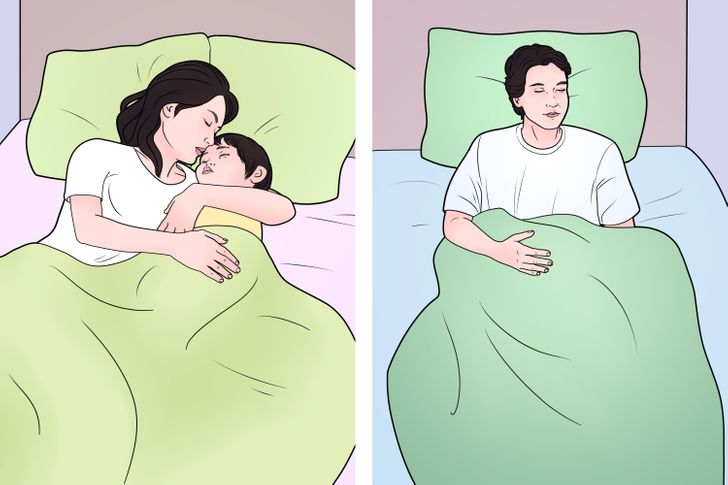Smaller houses and apartments don’t stop many Japanese couples from sleeping in different beds or even rooms. This is not some kind of an intimate issue or problem with the relationship, but something that they believe is good for them.
We at Bright Side found out why married couples in Japan choose to sleep separately, and we really like their reasons.
They have different sleep schedules.

The first thing that makes Japanese couples decide to go to bed separately is different work schedules. Waking up your significant other just because you got home late from work or have to leave early won’t result in good quality rest for them. This is why spending the night in a different room makes sense. This will give them both an undisturbed and healthier sleep.
Babies sleep with their mothers.

Japanese mothers sleep with their children and this is considered very important, so the father needs to decide if he wants to share the same bed or go to a different room. Even science has proven that co-sleeping can help parents and children get a more restful sleep. It helps the child to maintain a stable temperature and heart rate (which is really critical in infancy) and at the same time, it decreases the chance of sudden infant death syndrome. Also, this contributes to the child having better self-esteem, becoming independent faster, and doing great in school.
For them, sleeping separately means peace.

While many couples who start to sleep alone think that divorce is at their door, the Japanese see it differently. They value their sleep a lot and they don’t want to be disturbed while sleeping. This means that they don’t need and don’t like to put up with snoring, restless sleep, kicking, etc. Even though some don’t have the opportunity to sleep in different rooms, they still wish they could get their beauty sleep.
Couples have a history of sleeping separately.

© Shutterstock.com, © Shutterstock.com
Futons are filled with cotton, which provides support and comfort. In the past, only single sized ones were used as beds. So, even if you wanted to cuddle up with your loved one, you would have ended up between the sheets, on the cold floor, and you wouldn’t feel comfortable. Today there are families that still use this type of bedding, especially because it doesn’t take up a lot of space and it is easy to store.
Do you sleep separately from your partner? Do you think this type of practice might be even better for your relationship?
5 Crazy Inheritance Stories That Will Leave You Speechless

Inheritance isn’t always a simple matter of passing down money or family heirlooms. Sometimes, the drama surrounding wills and legacies can rival the wildest soap operas.
From shocking revelations to jaw-dropping twists, these five stories prove that when it comes to inheritance, the truth is often stranger than fiction. Whether it’s bizarre conditions for claiming a fortune or long-hidden secrets coming to light, these tales will leave you questioning just how well you know your own family.
Buckle up for a ride through some of the craziest inheritance stories you’ll ever hear!

A cemetery | Source: Midjourney
My Late Stepmother Left Me Her $2.5 Million Vacation Home While Her Daughters Only Got $5,000 Each
For years, I lived in the shadow of my stepfamily.
My dad married Linda when I was 12, and from the start, her daughters, Amanda and Becca, were the stars of the show. I was invisible, an afterthought in my own home.
Linda wasn’t cruel, but she wasn’t warm either. Holidays revolved around Amanda and Becca, and my attempts to connect were met with indifference. I was the quiet girl washing dishes while they laughed in the living room.

An upset girl with her eyes downcast | Source: Midjourney
By the time I turned 18, I couldn’t take it anymore.
I left for college, went no-contact with my stepsisters, and kept Linda at arm’s length.
Years passed.
I built a happy life with my husband, David, and our kids. I rarely thought about Linda until the day I got a call from her lawyer.

A woman holding a smartphone | Source: Midjourney
“Linda passed away last week from lung cancer,” he said.
I was stunned. I hadn’t even known she was sick. Then he dropped the bombshell.
“She left you her vacation home. It’s worth $2.5 million. And her daughters got $5,000 each.”
I was floored. Linda, who had barely acknowledged me, left me her most valuable asset? I couldn’t make sense of it. Unsurprisingly, Amanda and Becca were furious.

A startled woman holding a phone | Source: Midjourney
They accused me of manipulation and posted angry rants online.
Seeking answers, I visited the vacation home, a serene lakeside property that had been my dad’s favorite place. Memories of us fishing on the dock flooded back, bittersweet and vivid. As I searched the house, I found a letter from Linda tucked into a drawer.
In it, she admitted her failures.

A woman standing before a mansion | Source: Midjourney
I created a family hierarchy where you were always last. I watched you endure our coldness and did nothing. Over the years, I’ve seen Amanda and Becca’s entitlement, while you built a life of integrity.
This house is my apology. It’s a legacy from your father, who loved you completely, and from a mother who finally sees her mistakes.
Forgive me, if you can.

A woman holding an envelope | Source: Midjourney
Tears blurred my vision as I read her words. Linda had carried her guilt for years but hadn’t found the courage to fix things while alive. Her gift wasn’t just an inheritance; it was an attempt at redemption.
A week later, I learned Linda had also set up a $5 million trust for Amanda and Becca, but with a catch. They had to accept her will without hostility toward me. Their angry outbursts forfeited the trust, and the funds went to charity instead.
Amanda called me one evening, furious.

A shocked woman holding a letter | Source: Midjourney
“You stole everything from us, Carol!” she yelled.
I stayed calm, years of being dismissed having taught me emotional resilience.
“I didn’t steal anything, Amanda. Maybe you should think about why Linda made her decisions.”
She hung up, cutting ties completely.

A woman talking on the phone | Source: Pexels
That night, David and I sat on the porch of the vacation home, watching the sunset over the lake.
“Do you feel guilty?” he asked me.
“No, not guilty,” I replied. “But I do feel sad. Linda waited too long to make things right. But, I mean, at least she tried.”
Linda’s gift wasn’t perfect, but it gave me a chance to reclaim a piece of my history.
And that, at least, is something.

A magnificent house by the lake | Source: Midjourney
My Grandparents Cut Me off from the Inheritance – I Smiled Because My Plan Worked
For as long as I can remember, my grandparents doted on me, their golden child.
My brother, Tom, didn’t get the same treatment. As my mom’s son from her first marriage, he was always on the fringes of their affection. Though they were kind, it was clear he wasn’t truly accepted.
The favoritism hurt him deeply, but it wasn’t until I overheard a conversation between Tom and Mom that I realized how much.

A thoughtful woman | Source: Pexels
“Your business idea is brilliant,” Mom said. “Why don’t you ask Grandma and Grandpa for help?”
Tom sighed.
“They’d never agree, Christine. I’ve always been second-class to them. It’s not about the money; it’s about belonging.”
His words hit me like a ton of bricks, and I knew then that I had to change things.
It was up to me.

Woman smiling smugly | Source: Pexels
I came up with a plan and visited my grandparents the next day. Over tea, I gushed about extravagant plans for the inheritance they had promised me.
“I’m thinking about a yacht,” I said. “Or maybe a luxury car… or starting a high-end fashion line. You only live once, right?”
They exchanged uneasy glances, and I could see their doubt growing. I spent the rest of the visit dropping more hints about risky investments and wild spending.
Grandma’s smile faltered a bit. “Those are certainly… ambitious plans, dear. But how could you afford all of this?”
“I’ll figure it out!” I said.
When I left, I felt confident they’d see me as irresponsible.

An elderly woman wearing glasses | Source: Pexels
At the family dinner a few days later, my grandparents announced a shocking decision.
“Christine,” Grandpa said. “We’ve decided to cut you off from the inheritance.”
Gasps erupted around the table.
Mom’s fork clattered, Dad went pale, and Tom’s eyes widened in disbelief.

A worried woman | Source: Pexels
“What… but why?” I stammered, playing my part.
“We’ve noticed concerning behavior recently,” Grandma said firmly. “It seems you’re not ready for this responsibility. Tom is.”
“But what about Christine’s life? Her plans?” my father snapped.
I jumped in quickly.

A man frowning | Source: Pexels
“I’ll be fine,” I said, glancing at Tom. “I’ll finish my degree, and if that doesn’t work out, maybe Tom can give me a job at his firm.”
Tom looked overwhelmed and excused himself. I found him later in Grandpa’s study, staring out the window, fists clenched.
“Tom,” I said softly, closing the door behind me.
He turned, his voice shaking with disbelief.
“Christine, why would they do this? It doesn’t make any sense.”

A man and woman speaking | Source: Pexels
“They believe in you, Tom,” I said. “They see your potential. And now you can do whatever you want with this money!”
His voice rose, and he tightened his fist.
“This isn’t about me, Chris. They’ve always favored you. Why this? Why now?”
“I don’t know,” I lied. “But maybe it’s because of the business idea I mentioned. They must have seen how… brilliant it was.”

A sad man | Source: Pexels
For a moment, he studied me, suspicion flickering in his eyes. Then, his face softened, and he smiled.
“Christine,” he said. “Thank you. And don’t worry, if college doesn’t work out, there’s always a position waiting for you. Which do you prefer? Coffee girl or cleaner?”
I laughed, pulling my brother into a hug.
And as we stood there, I felt years of resentment begin to fade. This was the fresh start he deserved. Tom now has the inheritance and the confidence to chase his dreams.
My plan worked, and our family feels closer than ever.

Two people hugging | Source: Pexels
I Received a Huge Inheritance Even Though I Was an Orphan My Whole Life and Had No Relatives
I never expected my life to change that Thursday afternoon.
The phone rang while I was at work, and a voice on the other end spoke words I never thought I’d hear.
“Hello, Ms. Daniels. This is Mr. Stevens from Stevens & Associates. You’ve been named in an inheritance.”
I was stunned. Absolutely floored.

A young woman on her couch talking on her phone | Source: Midjourney
I had no family nor any relatives that I knew. My parents died in a car accident when I was three months old, leaving me to grow up in foster care. I asked the lawyer who had left me the inheritance because I needed to know the truth.
“A Mr. Greenwood,” he said.
The name meant nothing to me. I didn’t know any Mr. Greenwood, but I agreed to meet him the next day.

A man on his phone in his office | Source: Pexels
The next morning, as I prepared for the meeting, I couldn’t stop wondering about this man. My parents had been orphans, too, so there was no extended family.
How could a stranger have left me something?
It must have been a mistake.
When I arrived at the lawyer’s office, Mr. Stevens greeted me warmly. After we sat down, he opened a folder.

A lawyer in his office | Source: Pexels
“This might be difficult to hear, but please, stay with me.”
My stomach dropped.
“What do you mean?” I asked, a chill running down my spine.
“Mr. Greenwood was responsible for the car accident that killed your parents,” he said softly.

A woman in a lawyer’s office | Source: Midjourney
I froze, my mind racing. He explained that Mr. Greenwood had been drinking the night of the accident and lost control of his car. My parents had been in the wrong place at the wrong time.
“He was sentenced to 15 years for manslaughter,” Mr. Stevens continued in a somber tone. “While in prison, the guilt consumed him. So when he was released, he dedicated his life to making amends. He worked tirelessly, built a successful business, and saved every penny, intending to help you.”

A lawyer writing on a document | Source: Pexels
I could barely process his words.
“The inheritance is five million dollars,” Mr. Stevens said. “Every cent is meant for you.”
Part of me wanted to accept it.
I had struggled my whole life, working hard to get by with little to my name. This money could change everything. I could pay my debts, travel, even start fresh.
But another part of me felt sick.

A lawyer looking at his client | Source: Pexels
This money came from the man who had caused the greatest loss of my life.
“I don’t think I can take it,” I whispered.
Mr. Stevens wasn’t surprised.
“You don’t have to decide today,” he said.

A thoughtful woman | Source: Pexels
But I already knew my answer.
“I can’t live off his guilt. But I don’t want it wasted. Could you donate it to a charity for orphans?”
His smile was faint but understanding.
“Of course. I’ll make sure it goes to a good cause.”

A lawyer reading a document | Source: Pexels
A sense of relief washed over me. Though I still grappled with mixed emotions about Mr. Greenwood, knowing the money would help others felt right.
In the days that followed, I thought about my parents more than ever. Though their lives ended in tragedy, it seemed they had left a mark on Mr. Greenwood, prompting him to do something good.
I didn’t have all the answers I sought, but I felt closer to them in a strange way.
For the first time, I found a sense of peace.

A woman in her lawyer’s office | Source: Midjourney
My DIL Threw My Belongings Out of the House After Learning She Inherited It, but Karma Got Her That Same Day
After my father passed, his lawyer called about the will reading.
I couldn’t face it, so I asked my son, Matt, to go in my place. I was sure everything would be straightforward.
How wrong I was.
That day, I visited Dad’s nursing home to pick up his belongings. The small box they handed me was filled with simple treasures: his favorite sweater, a frayed Bible, and dog-eared mystery novels.

A woman speaking on her phone | Source: Midjourney
Tears streamed down my face as I sat in my car, clutching that box.
When I arrived home, my heartbreak turned to disbelief.
My belongings were strewn across the front lawn like trash—my mother’s china, my dad’s old quilt, and boxes of carefully packed memories.
“What the actual…?” I muttered, my voice shaking.

Boxes piled haphazardly on a front lawn | Source: Midjourney
“Oh, good, you’re back,” a smug voice called out.
Jessica, my daughter-in-law, was lounging on my patio furniture, sipping coffee as if nothing were wrong. She didn’t even glance up from her phone.
“Jessica! What is all this?” I demanded.
She lowered her sunglasses just enough to show the disdain in her eyes.

A woman scrolling on her phone | Source: Midjourney
“I’m doing what’s necessary. This is my house now.”
Her words hit me like a punch to the face.
“Your house? What are you talking about?”
Jessica held up a paper.
“Your dad left me the house in his will. Signed, sealed, delivered. Guess he knew who deserved it most, huh?”

Manicured fingernails | Source: Pexels
I staggered, gripping my car for support.
“That’s impossible. Dad wouldn’t—”
“Oh, but he did,” she sneered.
Before I could respond, Matt’s truck pulled into the driveway. He jumped out, his face a mix of confusion and anger.
“Jessica, what is going on? Why are Mom’s things on the lawn?”

A shocked man | Source: Midjourney
Jessica stood, smugly adjusting her sunglasses.
“I’m making changes, duh. And actually, there’s more you should know.”
“What do you mean?” Matt demanded.
Jessica smirked.
“I want a divorce.”

A smug woman | Source: Midjourney
Her words hung in the air, and Matt stared at her, stunned.
“I’m done with this family,” she continued. “You’ve all made me feel small for years. But now, I have the house, and I definitely don’t need you anymore.”
Fury flashed across my son’s face.
“You’ve been using me this whole time?”
Jessica shrugged.
“Oh, don’t act so surprised, Matt.”

A shouting woman | Source: Midjourney
As they argued, I pulled out my phone and dialed Dad’s lawyer.
“Please, tell me that Jessica is lying about the house being hers.”
The lawyer chuckled softly.
“She is,” he said. “Your father didn’t leave her the house. But he did leave her a fake document. When he was sorting out his affairs, he had me draw up a fake document to test her true colors.”

An emotional woman | Source: Midjourney
Relief and laughter bubbled out of me as I turned to Jessica.
“Oh, Jessica,” I said. “You really should have waited for the real will reading.”
Her smugness disappeared.
“What?”
“My father never left you the house. It was a test,” I explained.
Matt’s face darkened.
“Looks like Grandpa knew exactly who you were.”

An emotional man | Source: Midjourney
Jessica’s confidence shattered before us. She reached for Matt, trying to soften her face.
“Baby, I didn’t mean it! I was just upset!”
He stepped back.
“Save it. You want a divorce? You’ve got one. I’ll file for it tomorrow.”
As Jessica stomped off, I felt a sense of peace. Dad’s wisdom had protected us, proving that true inheritance lies in life lessons and the people who truly belong in your life. Later that evening, I put up a photo of my father on the mantle.

A woman holding an old photo | Source: Midjourney
I Entered the House I Inherited from My Late Grandfather for the First Time and Heard a Baby Crying from the Basement
The key stuck in the lock before turning with a groan.
I pushed open the door to my grandfather’s house—now my house. The musty smell and dim, dusty interior hit me like a wave of grief.
I dropped my bag by the door.
“Home sweet home,” I said to myself.

A woman approaching a house | Source: Midjourney
Grandpa had left me the house, but standing in the decaying space, it felt like more of a burden than a gift. I started cleaning to distract myself. Every object was a reminder of his absence: his armchair, the sagging couch, the dusty model trains.
As I sorted through expired food in the kitchen, the weight of my financial troubles loomed.
Student loans, property taxes, and repairs I couldn’t afford piled up in my mind.
That’s when I heard it.

A thoughtful woman | Source: Midjourney
A faint cry.
I froze. There it was again—a baby crying, coming from the basement. Heart pounding, I flicked on my phone’s flashlight and descended the creaky stairs.
At the bottom, the beam landed on three figures huddled in a corner: a man, a woman, and a baby wrapped in a ragged blanket.
The man raised his hands.

A family in a basement | Source: Midjourney
“Please,” he said. “We don’t mean any harm. We just had nowhere else to go…”
His name was David, and the woman was Sarah, holding their sick baby, Emma. They explained that they’d been homeless after David lost his job and couldn’t stay in the overcrowded shelters. Desperation led them to break into what they thought was an abandoned house.
Anger surged in me. My first instinct was to call the cops, but something made me hesitate. It was the shame in their eyes and the way Sarah kept gently rocking the crying baby.

A frowning woman | Source: Midjourney
“Look,” I said finally. “You can stay tonight. But tomorrow, you need to figure something else out.”
“Thank you,” David said quietly.
I retreated upstairs, but I couldn’t sleep. Grandpa had raised me after my parents died, never complaining about the burden. What would he think of me now, resenting this family for needing help?
In the morning, I brought them food and coffee. Emma’s coughing fit shook her tiny body, and I couldn’t ignore it.
“She needs a doctor,” I said.

An uncertain woman | Source: Midjourney
Sarah nodded but looked away.
“We know. We just can’t afford it.”
My resolve hardened.
“You’re not leaving until we get her some help.”
Over the next few days, I called shelters, community centers, and doctors.

A woman making a phone call | Source: Midjourney
I found space for them at a shelter and connected David to a job training program. A kind doctor even agreed to treat Emma for a reduced fee.
When they finally left, Sarah hugged me tightly.
“We’ll never forget what you’ve done for us.”
“Just pay it forward someday,” I replied. “And help your daughter live her best life.”

A woman holding a baby | Source: Midjourney
After they drove off in the shelter’s shuttle, I wandered through the quiet house, feeling lighter. In Grandpa’s study, I opened an old locked drawer for the first time.
Inside was a letter and a stack of savings bonds.
The letter read:
Sasha, the house and these bonds are yours. But the real inheritance is knowing you’re capable of more than you think.
All my love, Grandpa.
Tears streamed down my face. For the first time since he died, the house didn’t feel empty.
It felt like home.

A woman staring at old papers | Source: Midjourney
Inheritance isn’t always about wealth or property, it’s about the stories, lessons, and unexpected twists that come with it. These tales remind us that family ties, whether built on love, conflict, or even strangers’ actions, can lead to profound realizations and transformations.
From shocking betrayals to heartfelt redemption, each story reveals that the true value of an inheritance often lies in what it teaches us about ourselves and the people around us.

An urn on a mantle | Source: Midjourney
If you enjoyed this compilation, here’s another one for you |
Five gripping tales reveal what happens when karma takes center stage. From a sabotaged prom to a wedding day showdown, stolen dreams, and shocking secrets, these stepmothers’ schemes backfire in ways no one saw coming. Justice has never been so unexpected — or so satisfying.
This work is inspired by real events and people, but it has been fictionalized for creative purposes. Names, characters, and details have been changed to protect privacy and enhance the narrative. Any resemblance to actual persons, living or dead, or actual events is purely coincidental and not intended by the author.
The author and publisher make no claims to the accuracy of events or the portrayal of characters and are not liable for any misinterpretation. This story is provided “as is,” and any opinions expressed are those of the characters and do not reflect the views of the author or publisher.



Leave a Reply